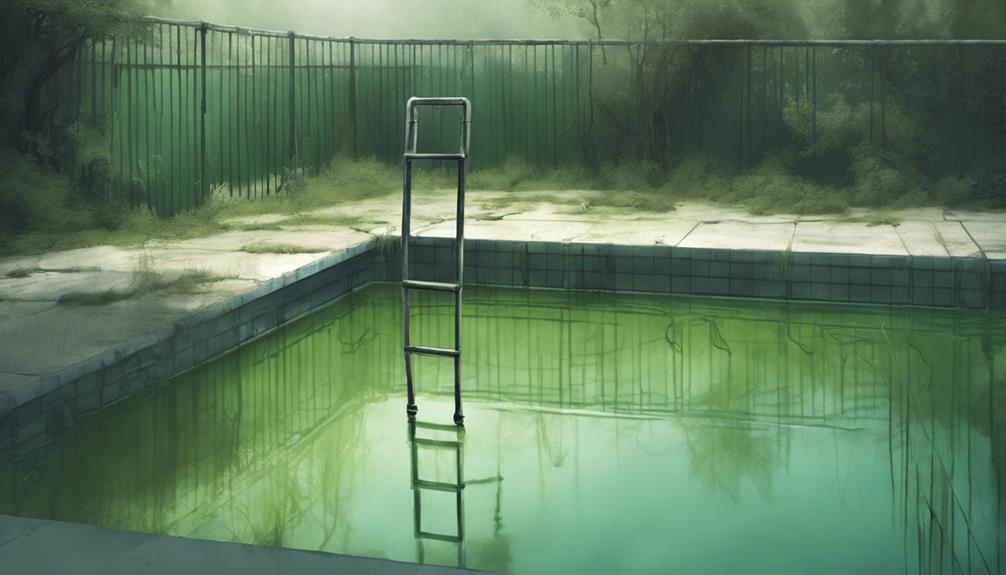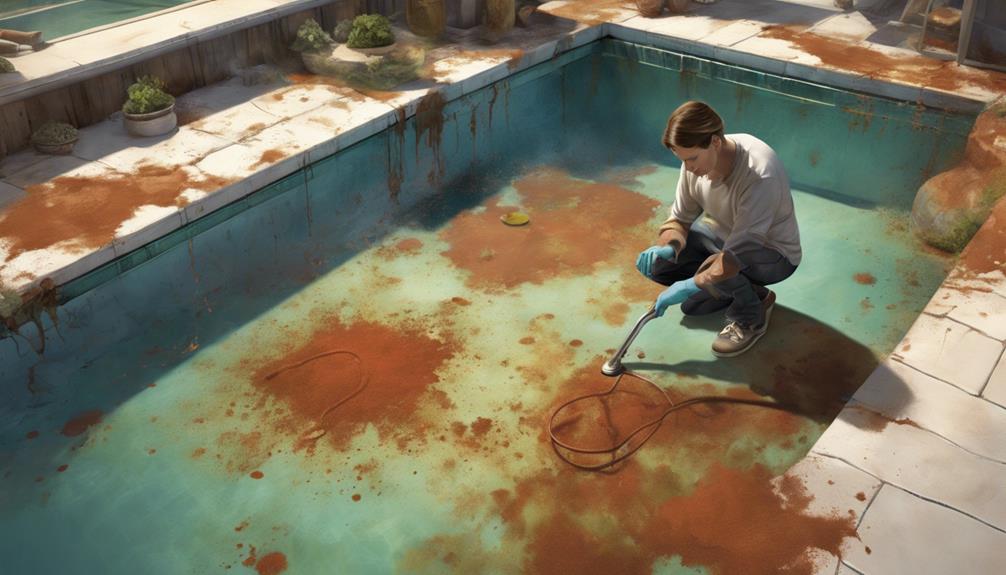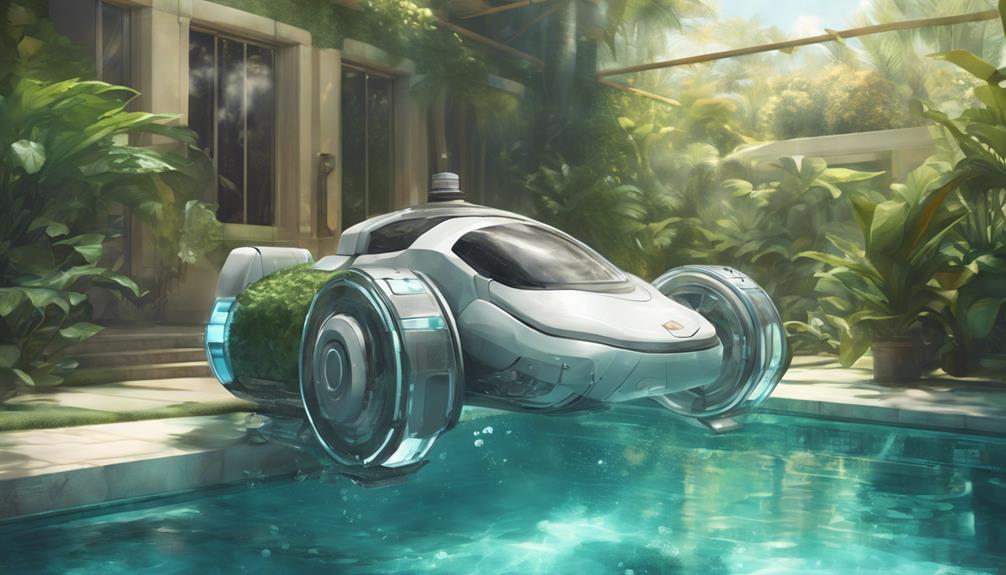Green water in pools can be a safety concern due to the growth of algae and bacteria, as well as slippery surfaces. It is crucial to clean the pool immediately to ensure a safe swimming environment. Algae growth may be a sign of insufficient chlorine levels, poor circulation, or filtration. Neglecting mild discoloration could lead to more serious contamination if not addressed promptly. To clean the pool, it is essential to remove debris, check pH levels, and shock the pool with chlorine treatment. Regular maintenance is key to preventing green water problems and maintaining a clean pool. Understanding the causes and effects of algae growth can help avoid further issues. Learn more about keeping green pools clean for a safe swimming experience.
Key Takeaways
- Algae growth in green water poses safety hazards like slippery surfaces and bacterial risks.
- Prompt cleaning, chemical treatment, and maintenance are crucial for safe swimming conditions.
- Causes of algae growth include lack of chlorine, poor circulation, and inefficient filtration systems.
- Regular maintenance, sanitation, and filtration prevent green water issues and ensure pool safety.
- Prevention strategies involve maintaining proper chlorine levels, good circulation, and efficient filtration systems.
Safety Hazards of Green Water
Green water in pools poses significant safety hazards due to the presence of algae and potential bacteria growth, highlighting the significance of prompt and effective cleaning and maintenance practices.
Algae growth in green water not only makes the pool water unappealing but also increases the risk of slips and falls due to slippery surfaces. Furthermore, certain types of algae can harbor harmful bacteria, posing health risks to swimmers.
The lack of proper sanitation and filtration in green water can lead to skin irritations, infections, or even respiratory issues. To ensure a safe swimming environment, it is essential to address green water promptly through thorough cleaning, proper chemical treatment, and regular maintenance to prevent the accumulation of algae and bacteria in pool water.
Causes and Effects of Algae Growth
Algae growth in pools can be attributed to various factors related to water quality and maintenance practices. The presence of algae is often a sign of inadequate sanitation and filtration, allowing algae to thrive in untreated water.
The effects of algae growth can range from mild discoloration to severe contamination, impacting both the pool's aesthetics and safety. Here are some key causes and effects of algae growth:
- Lack of Chlorine: Inadequate chlorine levels create an environment where algae can proliferate rapidly.
- Poor Circulation: Insufficient water circulation can create stagnant areas where algae can accumulate and grow.
- Improper Filtration: Inefficient filtration systems may not effectively remove algae spores, leading to their unchecked growth.
Cleaning and Maintaining Green Pools

Effective maintenance practices and timely cleaning procedures are necessary for restoring the clarity and safety of pools exhibiting green water conditions.
To clean a green pool, start by removing any large debris using a skimmer or leaf net. Next, test the water's pH levels and adjust them to around 7.2 for best cleaning conditions.
Shock the pool with a chlorine treatment to kill algae and bacteria, then run the pump and filter to remove dead algae and contaminants.
After cleaning, test the water for chlorine levels and adjust as needed to prevent algae regrowth.
Regular maintenance, including proper sanitation and filtration, is vital to prevent green water issues and maintain a safe swimming environment.
Frequently Asked Questions
Can Green Pool Water Cause Skin Irritation?
Swimming in green pool water can cause skin irritation due to algae and bacteria growth. Algae release toxins that can irritate the skin upon contact. Proper pool maintenance, including chlorine treatment and filtration, is vital to avoid skin issues.
Is It Safe to Swim in a Pool With Light Green Water?
Swimming in a pool with light green water is not safe due to low sanitizer levels. Algae growth indicates poor water quality, posing health risks. Immediate treatment through chlorine shock, pH adjustment, and filtration is crucial.
How Long Does It Take to Clear up Green Pool Water?
Clearing up green pool water can take anywhere from 24 hours to several days, depending on the severity of the algae bloom. Properly adjusting pH levels, shocking the pool with chlorine, and ensuring adequate filtration are key steps in the process.
Can Pets Get Sick From Swimming in Green Pool Water?
Pets can get sick from swimming in green pool water due to exposure to harmful bacteria in algae. For instance, a case study reported several dogs falling ill after swimming in green water. Regular pool maintenance and monitoring are essential to prevent such risks.
Will Green Pool Water Damage My Swimsuit?
Swimming in green pool water can damage swimsuits due to algae and chemicals present. Algae can stain fabrics, while high chlorine levels may cause fading or deterioration. Regular pool maintenance and proper water treatment can help prevent damage.
What precautions should be taken to ensure safety when swimming in pools with green water?
When swimming in pools with green water, it’s crucial to follow essential poolside safety guidelines to ensure a safe experience. Firstly, always check the water quality before swimming. Make sure the pool’s pH and chlorine levels are balanced. Additionally, avoid swallowing pool water and showering after swimming to remove any contaminants.
How Can Eco-Friendly Pool Products Help Address Green Water Concerns in Pools?
By using ecofriendly pool products, pool owners can effectively address green water concerns in their pools. Switching to ecologically friendly products like natural-based algaecides and chlorine alternatives can help maintain the pool’s water quality without harming the environment. Making the switch is a small step with big environmental benefits.
What are the safety concerns of green water in pools and how can they be addressed?
Green water in pools is a sign of algae growth, posing safety concerns for swimmers. To address this, regular pool maintenance and cleaning are essential. Chemical treatment and proper filtration can help in avoiding overflowing pool water and keeping the water clear and safe for use.
How Can Green Water in Pools Affect Pool Safety for Children?
Green water in pools can significantly impact pool safety for children. Algae growth and poor water quality can lead to increased slip hazards and make it difficult to see a child in distress. Regular maintenance and proper filtration are crucial for maintaining pool safety for children.
How Does Green Water in Pools Affect Pool Safety for Children?
The presence of green water in pools can significantly impact pool safety for children. Algae growth, which causes green water, can make the pool slippery and difficult to see through. This poses a major safety hazard for children who may slip and fall or become disoriented while swimming.Keeping up with proper pool maintenance is crucial for ensuring pool safety for children.
Conclusion
To wrap up, the presence of green water in pools should not be overlooked, as it poses serious safety hazards and indicates underlying issues.
By understanding the causes of algae growth and implementing effective cleaning and maintenance practices, the risks associated with green water can be minimized.
Remember, prevention is key in ensuring a safe and enjoyable swimming experience for all.










